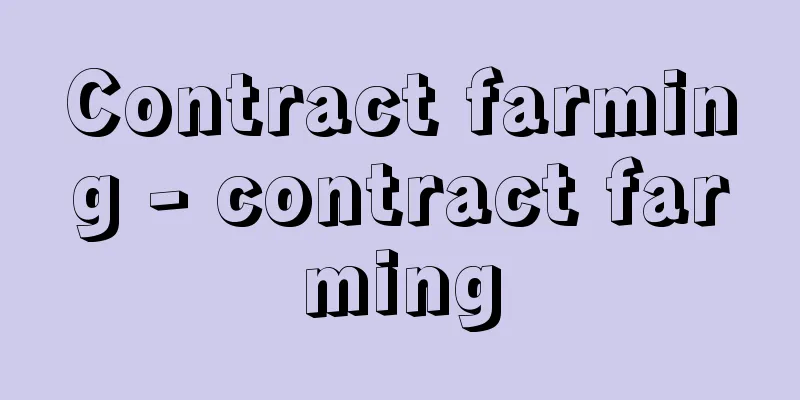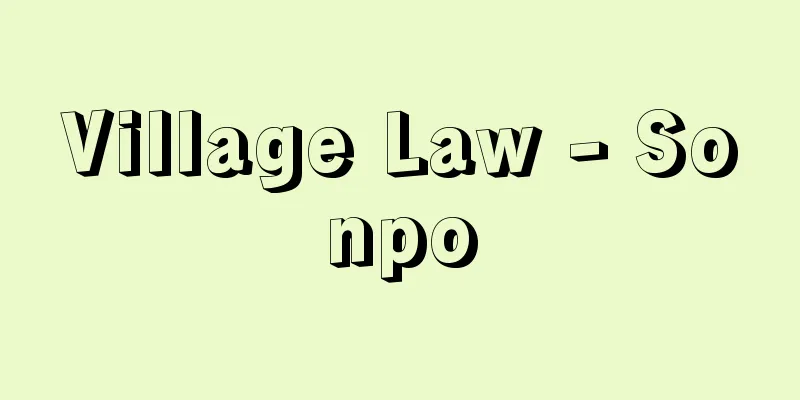Contract farming - contract farming

|
This is a general term for the form in which a farmer carries out agricultural production and sales activities based on a certain contractual relationship with a specific individual or business.Specific examples include contractual contract farming between farmers, division of labor based on contracts or agreements within a farming family (father-son contracts, family management agreements, etc.), and farming under certain conditions in which a farmer enters into a contract with a specific food company, wholesaler, or retailer for the supply of materials, provision of technology, and transaction terms.However, it is generally understood that this does not include cases where the only contract is a purchase and sale contract. The reason why contract farming must be distinguished from conventional farming is that in conventional farming, a large number of producers generally carry out anarchic production in response to an unspecified number of demands, whereas in contract farming, on the one hand, farmers are freed from communal constraints and enter into a free contractual relationship, but on the other hand, it means that they enter into a division of labor relationship under a specific route or lineage. Contract farming has arisen because, as dietary habits diversify and the food industry and food distribution industry develop, agricultural and livestock products undergo various processing and distribution stages on their way from farmers to the end consumer, it becomes difficult to keep up with the demands of small-scale production and sales of a wide variety of products, and it becomes more advantageous to produce and sell large quantities of products through specific routes by forming specific divisions of labor.However, on the other hand, this means that agricultural production is grouped together under specific companies and capital, and farmers are incorporated into new economic relationships. Contract farming became popular in the United States and Western Europe after World War II. In developing countries, various contract farming arrangements were also established between multinational agribusinesses and local farmers at the end of the 20th century. The main areas of contract farming are broiler breeding, egg-laying chicken farming, meat pig breeding, and canned food production, and are contract farming between farmers and distributors, feed suppliers, processors, etc. This has gradually spread to the fields of grains, fruits, and vegetables. In Japan, there were cases of special contract relationships between silk-reeling companies and sericulture farmers before World War II, and since the 1970s, there have been many cases of contract relationships between general trading companies or food companies and agricultural cooperatives or farmers in the fields of livestock products, vegetables, and fruits. [Usui Susumu] "An Economic Analysis of Contract Farming" by Takenaka Hisajio (1967, Miraisha)" ▽ "The Distribution Structure of the Livestock Economy" by Yoshida Tadashi (1974, Minerva Shobo)" ▽ "Modern Agricultural Markets" edited by Usui Susumu and Miyazaki Hiroshi (1990, Minerva Shobo)" ▽ "Agribusiness and Contract Farming" by D. Glover and K. Kusterer, supervised translation by Nakano Isshin (1992, Otsuki Shoten)" ▽ "Agribusiness Theory" edited by Nakano Isshin (1998, Yuhikaku) ▽ "Food Market Issues under Reorganization" edited by Mikuni Hidemi (2000, Tsukuba Shobo) [References] |Source: Shogakukan Encyclopedia Nipponica About Encyclopedia Nipponica Information | Legend |
|
農業者が特定の個人あるいは業者との間で一定の契約関係に基づいて農業生産や販売活動を行う形態を総称していう。具体的には、農業者同士の間での契約的な請負耕作や、農家の家族員内部での契約や協定による分担関係(父子契約や家族経営協定など)をはじめ、農業者と特定の食品企業や卸・小売業者との間で資材の供給、技術提供、取引条件などで一定の契約を行い、その条件のもとで農業を行う形態がある。しかし、単なる販売上の売買契約だけの場合はこれに含めないで理解するのが普通である。 契約農業を通常の農業と区別しなければならない理由は、通常の農業が、一般には多数の生産者によって不特定多数の需要を相手に無政府的な生産を行っているのに比べ、契約農業においては、農業者が一方では共同体的な制約から解放されて自由な契約関係にたつことを意味するが、他方では特定のルート・系列のもとでの分業関係に入り込むことを意味するからである。 契約農業が生ずるのは、食生活が多様化し、食品工業や食品流通業が発展して農畜産物が農業者から最終消費者に至るまでの間にさまざまな加工が施され流通段階を経るようになるにつれ、少量多種の生産販売では対応が困難となり、むしろ特定の分業関係を結ぶことによって大量の生産・販売を特定ルートで行うメリットが生ずるからである。しかし、このことは一面では、特定企業・特定資本によって農業生産が系列化され、農業者は新しい経済関係のなかに組み込まれることを意味する。 契約農業は第二次世界大戦後、アメリカや西ヨーロッパで盛んに行われるようになった。また、開発途上国においても20世紀末には多国籍企業化したアグリビジネスと現地農民との間にさまざまな契約農業が展開されている。そのおもなものは、ブロイラー飼育や採卵養鶏、肉豚飼育、缶詰生産などの分野であり、販売業者、飼料業者、加工業者などと農業者との間での契約農業である。これはしだいに穀物や果樹、野菜の分野にまで広がっている。わが国においても、第二次世界大戦前から製糸会社と養蚕農家との間で特約関係が結ばれた事例があり、1970年代以降では畜産物や野菜、果樹などの分野で、総合商社や食品会社と農業協同組合や農業者との間で契約関係が結ばれる事例が多くなっている。 [臼井 晋] 『竹中久二雄著『契約農業の経済分析』(1967・未来社)』▽『吉田忠著『畜産経済の流通構造』(1974・ミネルヴァ書房)』▽『臼井晋・宮崎宏編著『現代の農業市場』(1990・ミネルヴァ書房)』▽『D・グローバー、K・クスタラー著、中野一新監訳『アグリビジネスと契約農業』(1992・大月書店)』▽『中野一新編『アグリビジネス論』(1998・有斐閣)』▽『三国英実編著『再編下の食料市場問題』(2000・筑波書房)』 [参照項目] |出典 小学館 日本大百科全書(ニッポニカ)日本大百科全書(ニッポニカ)について 情報 | 凡例 |
>>: Negligence in concluding a contract
Recommend
World Council of Churches (WCC)
The world church movement (→ ecumenism) is a major...
Kuśinagara - Kuśinagara (English spelling)
An ancient country in central India, inhabited by ...
Emitter junction
…Under normal operating conditions, one p-n junct...
Kiyosumi moray eel - Kiyosumi moray eel
A perennial plant of the Orobanchaceae family (AP...
Japan Ground Self-Defense Force
The Self-Defense Forces, whose mission is to defen...
Ho Chi Minh (English spelling)
1890‐1969 Nguyen Sinh Cung was a revolutionary who...
One-to-one mapping
...Therefore, when f ( A ) = B holds, that is, fo...
Subarctic summer rainy climate - Akantainatsuamekikou
One of the subarctic climate divisions. Subarctic...
Babad Tanah Jawi (Chronicles of Java)
Although babad is usually a general term for Javan...
Kosaka mine
Located in Kosaka Town, Kazuno County, in northea...
Mount Kihara
...Melons, chrysanthemums, and carnations are shi...
Turks and Caicos Islands
Located at the southeastern end of the Bahamas in ...
Peace clause - Heiwajoukou
A procedural clause in a labor agreement is a clau...
frilled lizard
A lizard of the Agamidae family in the Squamata o...
Nobuyuki Nakajima
A politician of the Meiji period. Born in August ...





![Nagoya [city] - Nagoya](/upload/images/67cc6596a5b66.webp)



